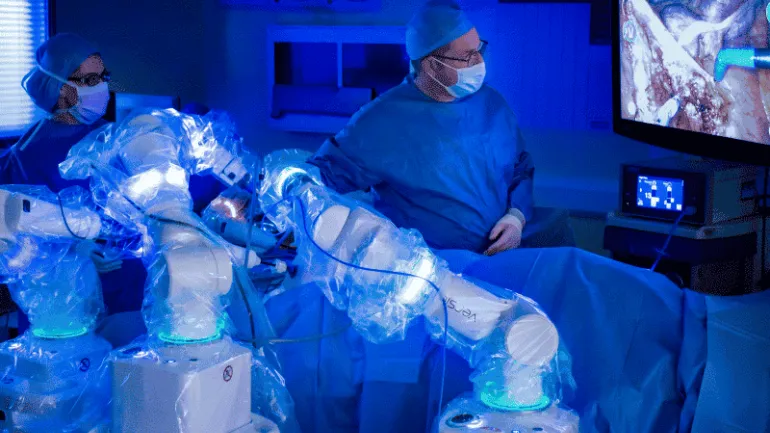
The All-Wales Robotic Assisted Surgery Programme is revolutionising access to cutting-edge robotic-assisted surgery for cancer patients throughout Wales. This advanced technology allows surgeons to control robotic arms that perform minimally invasive surgery to treat colorectal, upper gastrointestinal, urological, and gynaecological cancers.
Collaboration is at the heart of this programme. Partners working together include Health Boards from across Wales, the Moondance Cancer Initiative and Life Sciences Hub Wales. Welsh Government is co-funding the programme with £4.2 million over three years, with Health Boards providing £13.35 million over the next decade.
Life Sciences Hub Wales were pivotal in the programme’s the initial phase. Efforts focused on developing the National Business Justification Case, which helped secure Welsh Government approval and funding.
CMR Surgical is supplying its state-of-the-art Versius Surgical Robotic System to surgical teams in partnership with NHS Wales. CMR is also supporting research into the adoption of robotic-assisted procedures, alongside providing access to its global registry to deepen our understanding of patient outcomes and patient safety.
Learn more and get involved by contacting hello@lshubwales.com.
- Betsi Cadwaladr University Health Board
- Cardiff and Vale University Health Board
- Cwm Taf Morgannwg University Health Board
- Life Sciences Hub Wales
- Moondance Cancer Initiative
- CMR Surgical
- Welsh Government
- NHS Wales
CMR collaboration launched
CMR is announced as a partner for the All Wales National Robotics-Assisted Surgery Programme implementation of the Versius® Surgical Robotic System.
First patients undergo robotic assisted surgery in Wales under the national programme
State-of-the-art surgical robots are now helping to treat colorectal and gynaecological cancer patients in Wales as part of the new National Robotic Assisted Surgery Programme.
Patient treatment milestone
Cardiff and Vale University Health Board complete their first week of using robotic surgery to treat gynaecological cancer patients.
First robotic hysterectomy completed in Wales
The first robotic hysterectomy in Wales using the Versius robot has taken place at Betsi Cadwaladr University Health Board.
Programme statistics so far
- Robotic cases completed: 39
- Active robotic teams: 3
- Staff trained: 34
Programme statistics so far
- Robotic cases completed: 65
- Active robotic teams: 3
- Staff trained: 38
Programme statistics so far
- 100 Cases
- 8 Surgical Teams
- 55 Staff Trained
- 140 hours of Robotic-Assisted Surgery
Highlighting the project at NHS ConfedExpo
Our Chief Executive Officer, Cari-Anne Quinn, hosted a panel discussion exploring the programme's journey so far. Read a write up of the event on our news page.
New case study showcases impact of the programme
Highlighting how the programme has benefitted patients, staff and Wales. Read it in full.
Cwm Taf Morgannwg University Health Board joins the programme
The Health Board is the third to join and expands the programme’s remit on a national scale. Learn more about this exciting development.
The programme features in The Guardian ‘Future of Healthcare’ supplement
Our Chief Executive Officer penned an article for the print edition of The Guardian exploring the impact of the programme, how cross-sector partners have come together to deliver it, and exciting future steps. You can read it online too.
Programme Statistics
- 334 robotic cases completed
- 11 surgical teams
- 69 trained staff
- 533 hours of Robotic-Assisted Surgery
140 robotically assisted surgeries take place
Surgical teams and theatre staff at Ysbyty Gwynedd have now performed more than 140 robotically assisted surgeries – bringing faster and less painful recovery for patients. Find out more.
Programme Statistics
- 512 robotic cases completed
- 14 surgical teams
- 93 trained staff
- 821 hours of Robotic-Assisted Surgery
There’s a wealth of major benefits for patients, clinical staff and Wales as a whole.
The surgical systems are more precise and create smaller incision wounds. This means patients spend less time in hospital and recover much quicker. What’s more, its high accuracy reduces the risk of damaging nerves and other organs.
Surgeons using the system can sit or stand in a comfortable position during surgery to help reduce stress and fatigue – limiting the physical impact of conducting operations and potentially allowing them to stay in post longer. It’s also easier to learn how to do a robotic-assisted surgery when compared to traditional laparoscopic methods.
The programme is also helping to create a more sustainable healthcare system by keeping treatment closer to home. Once the programme is fully established, patients in North Wales can avoid travelling to England to receive robotic-assisted surgery.
Facilitating robotic-assisted surgery adoption in Wales is also starting to bring valuable training and recruitment opportunities here, as specialist staff are welcomed to learn and practice.
Betsi Cadwaladr University Health Board, Cardiff and Vale University Health Board and Cwm Taf Morgannwg University Health Board have all had Versius Surgical Robotic System installed. It’s expected that 1,300 patients will benefit from the programme once it’s at full capacity.
